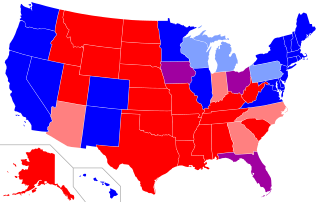Related Research Articles

The Country Liberal Party of the Northern Territory (CLP), commonly known as the Country Liberals, is a centre-right and conservative political party in Australia's Northern Territory. In territory politics, it operates in a two-party system with the Australian Labor Party (ALP). It also contests federal elections as an affiliate of the Liberal Party of Australia and National Party of Australia, the two partners in the federal coalition.

Euroscepticism, also spelled as Euroskepticism or EU-scepticism, is a political position involving criticism of the European Union (EU) and European integration. It ranges from those who oppose some EU institutions and policies and seek reform, to those who oppose EU membership and see the EU as unreformable. The opposite of Euroscepticism is known as pro-Europeanism.

The Liberal Party of Australia is a centre-right political party in Australia. It is one of the two major parties in Australian politics, the other being the Australian Labor Party. The Liberal Party was founded in 1944 as the successor to the United Australia Party. Historically the most successful political party in Australia’s history, the Liberal Party is now in opposition at a federal level, although it presently holds government in Tasmania and the Northern Territory at a sub-national level.
The Natural Law Party (NLP) is a transnational party founded in 1992 on "the principles of Transcendental Meditation", the laws of nature, and their application to all levels of government. At its peak, it was active in up to 74 countries; it continues in India and at the state level in the United States. The party defines "natural law" as the organizing intelligence which governs the natural universe. The Natural Law Party advocates using the Transcendental Meditation technique and the TM-Sidhi program as tools to enliven natural law and reduce or eliminate problems in society.

A political party is an organization that coordinates candidates to compete in a particular country's elections. It is common for the members of a party to hold similar ideas about politics, and parties may promote specific ideological or policy goals.
The Green Party of the United States (GPUS) is a federation of Green state political parties in the United States. The party promotes green politics, specifically environmentalism; nonviolence; social justice; participatory democracy; grassroots democracy; anti-war; anti-racism. As of 2023, it is the fourth-largest political party in the United States by voter registration, behind the Libertarian Party.
A one-party state, single-party state, one-party system or single-party system is a governance structure in which only a single political party controls the ruling system. All other parties are either outlawed or only enjoy limited and controlled participation in elections. Sometimes the term "de facto one-party state" is used to describe a dominant-party system that, unlike the one-party state, allows democratic multiparty elections, but the existing practices or balance of political power effectively prevent the opposition from winning power.

The Bharatiya Janata Party is a political party in India and one of the two major Indian political parties alongside the Indian National Congress. Since 2014, it has been the ruling political party in India under the incumbent Prime Minister Narendra Modi. The BJP is aligned with right-wing politics and has close ideological and organisational links to the Rashtriya Swayamsevak Sangh (RSS), a far-right paramilitary organisation. Its policies adhere to Hindutva, a Hindu nationalist ideology. As of January 2024, it is the country's biggest political party in terms of representation in the Parliament of India as well as state legislatures.

The Austrian People's Party is a Christian-democratic and liberal-conservative political party in Austria.

Party primaries or primary elections are elections in which a political party selects a candidate for an upcoming general election. Depending on the country and administrative division, there may be an "open primary", in which all voters are eligible to participate, or a "closed primary", in which only members of a political party can vote.

The Pakistan People's Party is a centre-left political party in Pakistan, currently being the largest in the Senate and second-largest party in the National Assembly. The party was founded in 1967 in Lahore, when a number of prominent left-wing politicians in the country joined hands against the rule of Ayub Khan, under the leadership of Zulfikar Ali Bhutto. It is affiliated with the Socialist International. The PPP's platform was formerly socialist, and its stated priorities continue to include transforming Pakistan into a social-democratic state, promoting egalitarian values, establishing social justice, and maintaining a strong military. It, alongside the Pakistan Muslim League-Nawaz and the Pakistan Tehreek-e-Insaf, is one of the three largest political parties of Pakistan.

The United Democratic Party is one of the two major political parties in Belize. It is currently the main opposition party, having lost the 2020 Belizean general election, after previously holding the government across three prior terms. Founded as a centre-right conservative party, the UDP is led by Moses Barrow.

Open list describes any variant of party-list proportional representation where voters have at least some influence on the order in which a party's candidates are elected. This is as opposed to closed list, in which party lists are in a predetermined, fixed order by the time of the election and gives the general voter no influence at all on the position of the candidates placed on the party list.

Elections to the European Parliament take place every five years by universal adult suffrage; with more than 400 million people eligible to vote, they are the second largest democratic elections in the world after India's.

The Liberal–National Coalition, commonly known simply as the Coalition or the LNP, is an alliance of centre-right to right-wing political parties that forms one of the two major groupings in Australian federal politics. The two partners in the Coalition are the Liberal Party of Australia and the National Party of Australia. Its main opponent is the Australian Labor Party (ALP); the two forces are often regarded as operating in a two-party system. The Coalition was last in government from 2013 to 2022. The group is led by Peter Dutton, who succeeded Scott Morrison after the 2022 federal election.

Starting with the 2000 United States presidential election, the terms "red state" and "blue state" have referred to US states whose voters vote predominantly for one party—the Republican Party in red states and the Democratic Party in blue states—in presidential and other statewide elections. By contrast, states where the vote fluctuates between the Democratic and Republican candidates are known as "swing states" or "purple states". Examining patterns within states reveals that the reversal of the two parties' geographic bases has happened at the state level, but it is more complicated locally, with urban-rural divides associated with many of the largest changes.

Citizens' Movement is a Mexican centre-left political party. The party was founded in 1999, under the name Convergence for Democracy, which was then shortened to Convergence in 2002 and changed to Citizens' Movement in 2011.

Parliamentary elections were held in Syria on 7 May 2012 to elect the members of the Syrian People's Council. The elections followed the approval of a new constitution in a referendum on 26 February 2012.
The National Regeneration Movement, commonly referred to by its syllabic abbreviation Morena, is a major left-wing populist political party in Mexico. As of 2023, it is the largest political party in Mexico by number of members; it has been the ruling party since 2018, and won a second term in the 2024 general election.
References
- ↑ "By-Elections 1963-1966". Psephos. Archived from the original on 10 October 2012. Retrieved 19 May 2012.